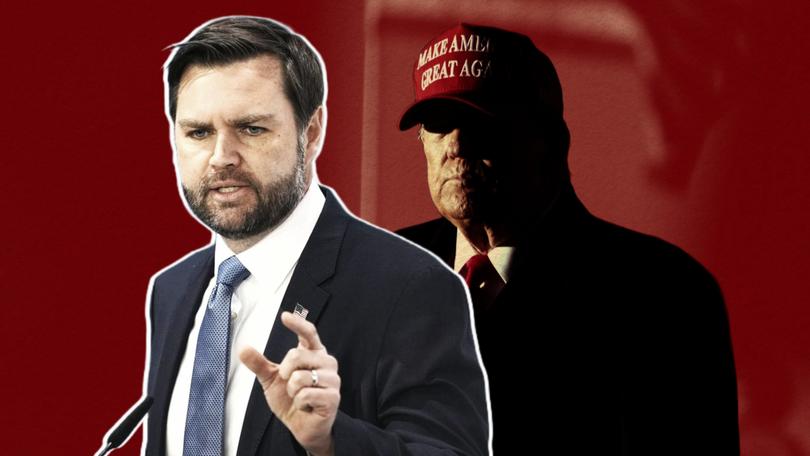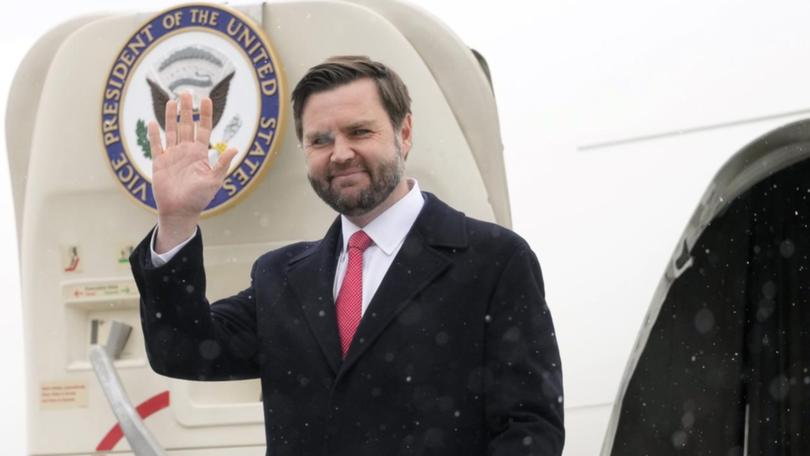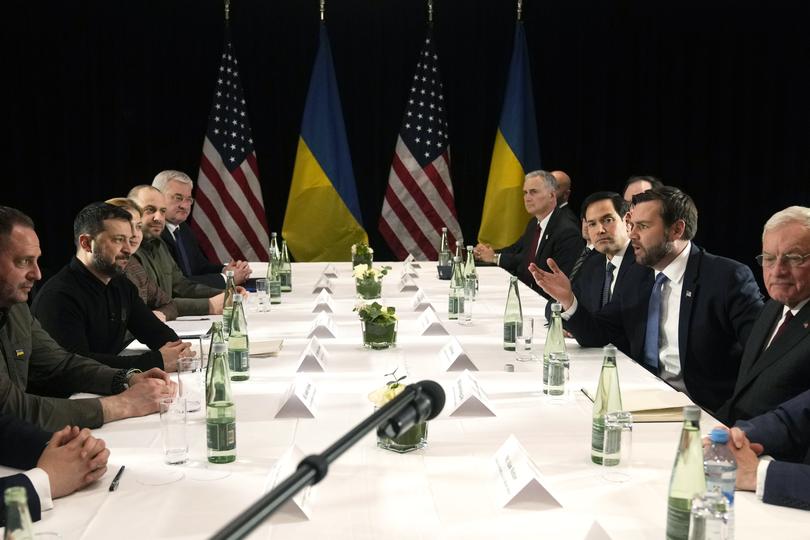THE WASHINGTON POST: J.D. Vance is on a mission to export the MAGA message in his international debut
THE WASHINGTON POST: Vice President JD Vance made his vice-presidential debut on the global security stage in Europe with a scolding speech and one clear mission: take MAGA to the world.

JDD Vance made his vice-presidential debut on the global security stage Friday in a scolding speech here, pressing Europe’s centrist leaders to move over to accommodate the rising anti-migration, nationalist voices they have at times sought to block from power.
Vance also met with Alice Weidel, head of the nationalist Alternative for Germany party, becoming the most senior U.S. official to do so. He also met in recent days with the leaders of Germany’s two other major parties, which are locked in competition ahead of the February 23 elections in which Weidel’s party is trying to break through a post-World War II taboo and join a ruling coalition for the first time.
In his speech, Mr Vance fully waded into nationalist politics, blasting an audience of European prime ministers and presidents for failing to listen to their own voters. His remarks amounted to an attempt to export MAGA to Europe — and a declaration of common cause with rising anti-migrant parties in Europe, who, like President Trump, are sceptical of international alliances and many of the hallmarks of the global system that developed in the aftermath of World War II and expanded after the fall of communism.
Sign up to The Nightly's newsletters.
Get the first look at the digital newspaper, curated daily stories and breaking headlines delivered to your inbox.
By continuing you agree to our Terms and Privacy Policy.“No voter on this continent went to the ballot box to open the floodgates to millions of unvetted immigrants,” Mr Vance said.
“But you know what they did vote for? In England, they voted for Brexit. And agree or disagree, they voted for it. And more and more all over Europe, they’re voting for political leaders who promise to put an end to out-of-control migration.”

The Alternative for Germany, or AfD, has grown rapidly since it was founded in 2013, but other mainstream German parties have refused to work with it. Friedrich Merz, the head of the centre-right Christian Democratic Union, who is widely expected to become the country’s next chancellor, flirted with working with the party last month — and faced significant blow-back from his Christian Democratic predecessor Angela Merkel and others inside and outside his party. The AfD takes a hard-line, anti-immigrant stance and says modern-day Germany should spend less time blaming itself for its Nazi past.
President Donald Trump and his allies have tangled with Europeans for years. But in an auditorium filled with Europe’s security policy-making elite, Mr Vance surprised the crowd by saying little about the rapidly developing efforts to end Russia’s war in Ukraine — although he did sit down with Ukrainian President Volodymyr Zelensky later in the day.
Instead, he accused allies by name of what he said were efforts to subvert the will of the people in the name of protecting migrants and fighting back Russian influence efforts.
“In America, you cannot win a democratic mandate by censoring your opponents or putting them in jail,” Mr Vance told the gathered elite at the Munich Security Conference, in remarks that some European leaders interpreted as a slam that they were not truly democratic.
“Nor can you win one by disregarding your basic electorate on questions like who gets to be a part of our shared society and of all the pressing challenges that the nations represented here face. I believe there is nothing more urgent than mass migration today.”
He blasted Romania’s Constitutional Court for annulling the first round of its presidential elections in December after allegations that a Russian influence campaign had delivered a boost to a little-known ultra-nationalist candidate days ahead of the vote.
He attacked British leaders for prosecuting a 51-year-old man for conducting silent prayer near an abortion clinic in what authorities said was a violation of protests within a buffer zone outside those facilities.
And he linked Germany’s past migration-friendly policies to an incident in Munich on Thursday in which a 24-year-old Afghan asylum seeker drove a car into a crowd of labor protesters, injuring 30, in what authorities said they believe was an intentional attack.
In Munich, “I’ve heard a lot about what you need to defend yourselves from,” Mr Vance said.
“What has seemed a little bit less clear to me, and certainly, I think to many of the citizens of Europe, is what exactly it is that you’re defending yourselves for.
“What is the positive vision that animates this shared security compact that we all believe is so important? … If you’re running in fear of your own voters, there is nothing America can do for you.”
Mr Vance also appeared to treat Ukraine as an afterthought in his remarks, even though for many in the crowd, it was a life-and-death subject for which they had hoped to get answers.
“The Trump administration is very concerned with European security and believes that we can come to a reasonable settlement between Russia and Ukraine, and we also believe that it’s important in the coming years for Europe to step up in a big way to provide for its own defence,” Mr Vance said.
The speech received a chilly reception in the gilded Bayerischer Hof hotel auditorium. When the speech ended, most remained in their seats as a handful of Republicans on a lower balcony gave muted applause.
German Defense Minister Boris Pistorius, a member of the centre-left Social Democrats, blasted Mr Vance soon afterwards.
“This democracy was called into question by the U.S. vice president,” Mr Pistorius told the gathering.
“He compares the condition of Europe with what is happening in autocracies. This is not acceptable.”
A year ago, Mr Vance visited the Munich gathering as the junior senator from Ohio, crowded into the margins as former vice president Kamala Harris sought to assure allies that Washington was an unwavering partner that would protect the existing global order, not overthrow it.
This time, Mr Vance is the centre of attention, a measure of the degree to which Trump’s election victory has energised forces that advocate nationalist agendas, higher trade barriers and tighter borders.
Mr Vance’s whirlwind 32 hours in Germany began Thursday, when he and second lady Usha Vance visited the Dachau concentration camp. Vance toured the camp with a 97-year-old Holocaust survivor, Abba Naor, who pointed to locations on a map of the Nazi camp network with his cane.
Mr Vance reviewed the prisoners’ badges, which identified them by classifications such as immigrants or homosexuals. He and his wife paused at the end of the tour in front of a wall that said, “Never Again” in multiple languages.
“I’ve read a lot about the Holocaust in books, but being here and seeing it up close in person really drives home what unspeakable evil … was committed and why we should be committed to ensuring that it never happens again,” he said.

Mr Vance’s meeting with President Zelensky — alongside Secretary of State Marco Rubio and special envoy for Russia and Ukraine Keith Kellogg — did not yield a timeline for reaching a deal.
Afterwards, Mr Vance told reporters: “We want the war to come to a close. We want the killing to stop, but we want to achieve a durable, lasting peace, not the kind of peace that’s going to have Eastern Europe in conflict just a couple years down the road.”
President Trump has alarmed Europe by appearing to make significant concessions to Russian President Vladimir Putin even before formal negotiations start. Mr Putin has long sought to block Ukraine from entering the NATO defence alliance, and Mr Trump said Thursday he doesn’t see any way Russia “could allow them to join”. Worried Europeans said Mr Trump was handing Russia their strongest bargaining chip before it could be used.
Mr Vance also huddled with leaders from NATO, Britain and Germany in back-to-back bilateral meetings. In brief public remarks amid each sit-down, he appeared to strike a largely positive tone and did not bring up the divisive issues that animated his speech on the main stage later in the day.
Ahead of a Friday meeting with NATO Secretary General Mark Rutte, Mr Vance said Washington would remain Europe’s ally, but that the continent needed to do more to improve its own military capabilities as the Trump administration reorients its attention toward dealing with China.
“NATO is a very important military alliance, of course, that we’re the most significant part of,” Mr Vance said alongside Rutte.
“But we want to make sure that NATO is actually built for the future, and we think a big part of that is ensuring that NATO does a little bit more burden-sharing in Europe, so the United States can focus on some of our challenges in East Asia.”
Mr Rutte said Mr Vance was “absolutely right” about Europe’s need to step up within NATO.
Opening talks to halt the war in Ukraine are set to begin next week, Trump said Thursday, a rapid effort after years in which relations between Russia and the United States have been all but frozen. “Top officials” from Washington and Moscow — but not Trump or Putin — will meet in Saudi Arabia, the president said.
“Ukraine will be a part of it, too. And we’re going to see if we can end that war. That was a horrible war,” he said Thursday.
Mr Zelensky on Friday expressed frustration with Mr Trump’s attitude about the origins of the war, which he has blamed on Ukraine’s desire to join NATO. Kyiv added that desire to its constitution in 2019, five years after Russia annexed Ukraine’s Crimean Peninsula and backed a separatist war in the eastern part of the country.
President Trump and the United States “believe that Ukraine cannot be in NATO because it would mean escalation with the ‘Russians,’” Mr Zelensky told a roundtable of Ukrainian journalists in Munich, according to Ukrinform, a news wire.
Mr Zelensky said Ukraine would need to double the size of its military to rival Russia’s military might unless it gained entrance to the defence alliance.
Mr Trump’s approach to the talks has been an energy boost to Putin, who has long sought to sit down with a U.S. leader to remake the post-Cold War security architecture — and now appears to have a chance to do so, consigning Europe to a back-seat role in the conversation.
Generations of U.S. leaders before Mr Trump have said that Russia has neither the power nor the right to veto how Europe protects itself. Even his decision to speak to Putin before consulting with Mr Zelensky was a victory for the Kremlin.
© 2025 , The Washington Post
